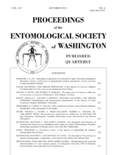
PROCEEDINGS OF THE ENTOMOLOGICAL SOCIETY OF WASHINGTON
Scope & Guideline
Elevating Entomological Knowledge Since 1981
Introduction
Aims and Scopes
- Taxonomy and Systematics:
The journal publishes detailed taxonomic revisions, descriptions of new species, and updates on classifications across various insect orders, contributing to the global understanding of insect biodiversity. - Ecological Interactions:
Research exploring the ecological roles of insects, including their interactions with plants and other species, is frequently featured, emphasizing the importance of insects in ecosystems. - Pest Management and Biological Control:
Studies on pest species, their impact on agriculture, and potential biological control methods highlight the journal's commitment to practical applications of entomological research. - Geographic Distribution and Biogeography:
Papers documenting new geographical records and distribution patterns of insects enhance the understanding of species range and biogeography, particularly in North America. - Life History and Behavior Studies:
The journal includes research focused on the life cycles, behaviors, and ecological adaptations of various insect species, contributing to the broader understanding of their biology.
Trending and Emerging
- Molecular Phylogenetics and Systematics:
An increasing number of studies are utilizing molecular techniques to elucidate relationships among species, indicating a trend towards integrating genetic data into taxonomy and systematics. - Insect-Plant Interactions and Co-evolution:
Research focusing on the intricate relationships between insects and their host plants, including co-evolutionary dynamics, is gaining prominence, highlighting the ecological significance of these interactions. - Impact of Climate Change on Insect Populations:
Emerging studies are addressing how climate change affects insect distribution, behavior, and ecology, reflecting a growing concern for environmental impacts on biodiversity. - Urban Entomology and Pest Management:
The rise of urbanization has led to an increased focus on urban entomology, including studies on pests in urban environments and innovative management strategies. - Conservation Biology and Insect Diversity:
There is a notable trend towards research emphasizing conservation strategies for insect diversity, addressing the urgent need to protect declining insect populations.
Declining or Waning
- Traditional Morphological Studies:
There has been a noticeable decline in papers focusing exclusively on morphological studies that do not integrate modern techniques such as molecular analysis or ecological assessments. - General Insect Ecology without Specific Contexts:
While ecological studies remain relevant, there is a waning interest in broad ecological assessments that do not provide specific applications or insights into pest management or conservation. - Historical Taxonomy without New Findings:
Research that primarily revises historical taxonomies without new species descriptions or significant updates has decreased, indicating a shift towards more impactful contributions.
Similar Journals

BULLETIN OF INSECTOLOGY
Innovating Research in Insect BiologyBULLETIN OF INSECTOLOGY is a prominent academic journal published by ALMA MATER STUDIORUM, UNIV BOLOGNA, Italy, specializing in the field of Insect Science. The journal, with ISSN 1721-8861 and E-ISSN 2283-0332, has established itself as a vital resource for researchers and professionals interested in the diverse aspects of entomology and its applications. It ranks in the Q2 category for Insect Science as of 2023, placing it among the top journals in its field with a Scopus rank of 79 out of 181. The BULLETIN OF INSECTOLOGY is committed to disseminating high-quality research and innovative studies, facilitating open dialogue and collaboration among scientists. As an essential platform for sharing groundbreaking findings, it contributes significantly to the body of knowledge in agricultural and biological sciences, making it an invaluable asset for scholars and practitioners alike. With coverage from 2002 to 2024, this journal continues to foster advancements in entomological research and its importance in tackling environmental challenges.
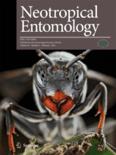
NEOTROPICAL ENTOMOLOGY
Fostering Insights into Tropical EntomologyNEOTROPICAL ENTOMOLOGY, published by the Entomological Society of Brazil, is a leading journal in the field of Insect Science, recognized for its significant contributions to the understanding of entomological research within the Neotropical region. With an impact factor placing it in the Q2 category and ranked #52 out of 181 in the Scopus rankings for Agricultural and Biological Sciences, this journal provides a vital platform for both seasoned researchers and emerging scholars to publish their innovative findings. Covering a broad scope of topics related to entomology, NEOTROPICAL ENTOMOLOGY aims to highlight the unique biodiversity and ecological significance of insects, fostering further appreciation and study within this crucial area of life sciences. The journal is available in both print (ISSN: 1519-566X) and online (E-ISSN: 1678-8052), ensuring accessibility to a wide audience and enhancing the dissemination of knowledge. As it converges towards its 2024 volume, the journal remains committed to advancing the scientific understanding of insect life in the tropics, making it an essential resource for researchers, professionals, and students alike.

EUROPEAN JOURNAL OF ENTOMOLOGY
Pioneering insights into insect biology and ecology.The European Journal of Entomology, published by the Czech Academy of Sciences, Institute of Entomology, is a pivotal journal in the field of Insect Science. With a solid impact factor and recognized ranking—placed in the Q2 quartile in 2023, and ranked #72 out of 181—this journal offers a platform for researchers and professionals alike to share insightful studies and advancements in entomological research. Since its inception in 1993, the journal has continuously evolved to cover a wide spectrum of entomological disciplines, establishing itself as an essential resource for academia and industry. Although it operates on a subscription basis, the journal ensures accessibility for a broad audience of scholars, students, and enthusiasts eager to stay at the forefront of entomological science. Located in Ceske Budejovice, Czech Republic, this journal not only highlights European contributions but also embraces global perspectives, making it an indispensable reference point in the ongoing exploration of insect biology and ecology.

Insects is a prominent open-access journal published by MDPI, dedicated to advancing research in the vibrant field of insect science. Since its inception in 2011, this journal has become a vital resource for academics and professionals alike, also ranked in the prestigious Q1 category within the Insect Science field by Scopus, achieving a remarkable rank of 26 out of 181 journals. With an ongoing convergence period from 2010 to 2024, Insects provides comprehensive coverage of various aspects of entomology, including but not limited to ecology, behavior, physiology, and applied entomology. Based in Switzerland, the journal promotes an open-access model, ensuring that vital research is readily available to researchers, practitioners, and students globally. This journal not only facilitates the dissemination of groundbreaking entomological research but also fosters collaboration and interdisciplinary dialogue in the field.

REVISTA COLOMBIANA DE ENTOMOLOGIA
Pioneering Insights into Colombia's Insect DiversityREVISTA COLOMBIANA DE ENTOMOLOGIA, published by the SOC COLOMBIANA ENTOMOLOGIA-SOCOLEN, serves as a vital platform for disseminating research in the field of insect science. With an ISSN of 0120-0488, the journal has established itself as a key resource for entomologists, agricultural scientists, and biodiversity researchers, focusing on the ecology, taxonomy, and behavior of insects within the Colombian context and beyond. Despite its Q4 ranking in 2023, REVISTA COLOMBIANA DE ENTOMOLOGIA strives to enhance its impact within the academic community, offering a space for innovative studies and reviews that aim to advance the understanding of insect-related phenomena. As a publication addressing critical concerns in agricultural and biological sciences, it invites contributions that explore new methodologies and findings relevant to the insect world. Although it does not currently offer Open Access options, the journal's growth from 2004 to 2024 reflects its commitment to evolving with the needs of its readership and contributors, making it an essential reference point for students and professionals alike interested in entomological research.
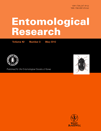
ENTOMOLOGICAL RESEARCH
Pioneering Discoveries in Biodiversity and Insect ImpactENTOMOLOGICAL RESEARCH, published by Wiley, is a prominent journal within the field of Insect Science, with a significant focus on advancing our understanding of entomological studies, including pest management, biodiversity, and ecological impacts of insects. Since its inception in 2007, the journal has served as a vital platform for researchers and practitioners to publish high-quality, peer-reviewed articles that contribute to the growing body of knowledge in this essential discipline. With an H-index illustrating its citation impact and its classification in the 2023 Scopus quartile rankings at Q3, ENTOMOLOGICAL RESEARCH ranks 69 out of 181 journals in its field, positioning itself within the 62nd percentile, which underscores its relevance and contribution to agricultural and biological sciences. Although it does not offer Open Access, the journal remains committed to ensuring that its content reaches the widest possible audience, supporting ongoing discoveries and innovations in insect science. For researchers, professionals, and students seeking to remain at the forefront of entomological advancements, ENTOMOLOGICAL RESEARCH is an indispensable resource.
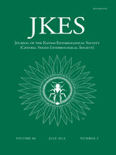
JOURNAL OF THE KANSAS ENTOMOLOGICAL SOCIETY
Bridging Research and Agricultural ImpactJOURNAL OF THE KANSAS ENTOMOLOGICAL SOCIETY, published by the Kansas Entomological Society, serves as a vital platform dedicated to the field of entomology and insect science. With an ISSN of 0022-8567 and an E-ISSN of 1937-2353, this journal has established itself since its inception in 1994, continuing to contribute valuable research up to 2024. Despite its current Q4 categorization in the 2023 Insect Science rankings, it ranks 106 out of 181 in Scopus, representing a significant opportunity for researchers to disseminate their findings in a supportive and engaged community. Although it is not an open-access journal, its commitment to rigorous peer review and relevance in agricultural and biological sciences makes it an essential resource for professionals, scholars, and students alike. The journal's focus on local and regional entomological issues often addresses broader ecological impacts, showcasing the importance of insects in environmental health and agriculture. We invite you to explore the rich tapestry of findings and discussions within this esteemed publication.
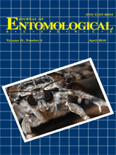
JOURNAL OF ENTOMOLOGICAL SCIENCE
Pioneering Insights in Insect Science and EcologyJOURNAL OF ENTOMOLOGICAL SCIENCE, published by the Georgia Entomological Society Inc, is a crucial resource in the field of insect science and ecology. With a rich history since its inception in 1993, the journal provides a platform for innovative research and comprehensive reviews addressing various aspects of entomology. Although not an open-access journal, it is highly regarded within its community, holding a Q3 ranking in Agronomy and Crop Science, Ecology, Evolution, Behavior and Systematics, and Insect Science as of 2023. Each issue promises to contribute valuable insights to professionals, researchers, and students alike, making it an essential publication for those looking to stay abreast of developments in entomological studies. The journal's editorial commitment ensures that it remains at the forefront of entomological research through rigorous peer reviews and a dedication to scholarly excellence.
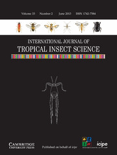
INTERNATIONAL JOURNAL OF TROPICAL INSECT SCIENCE
Exploring the Ecological Impact of Insect DiversityINTERNATIONAL JOURNAL OF TROPICAL INSECT SCIENCE, published by Springer International Publishing AG, is a leading interdisciplinary journal dedicated to advancing knowledge in the fields of insect science and ecology. With its ISSN 1742-7584 and E-ISSN 1742-7592, this journal provides a platform for researchers to publish high-quality, peer-reviewed articles that explore various aspects of tropical insect biology, behavior, and their ecological impacts. As evidenced by its Q3 ranking in both Ecology, Evolution, Behavior and Systematics and Insect Science, it plays a vital role in fostering scientific dialogue and innovation within these disciplines. Researchers affiliated with the journal benefit from its visibility and growing impact, as demonstrated by its Scopus ranks, with a percentile standing of 61st in Insect Science. Although the journal is not open access, it still reaches a wide academic audience, making significant contributions to our understanding of tropical ecosystems. Situated in Switzerland, this journal is crucial for students, professionals, and researchers invested in the intersection of entomology and ecological science.
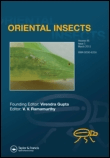
ORIENTAL INSECTS
Advancing Knowledge in Oriental Insect ScienceORIENTAL INSECTS is a distinguished journal dedicated to advancing the field of Insect Science, published by the reputable Taylor & Francis Ltd. With its long-standing history since 1967, this journal provides a platform for innovative research focused specifically on the diverse insect fauna of the Oriental region, encompassing topics such as taxonomy, ecology, physiology, and behavior. The journal is indexed with an ISSN of 0030-5316 and an E-ISSN of 2157-8745, making it easily accessible to a global audience. Although it currently does not operate under an Open Access model, its rigorous peer-review process ensures the dissemination of high-quality research. As a Q4 journal in the Insect Science category for 2023 and ranked 103 out of 181 in Scopus, ORIENTAL INSECTS remains a vital resource for researchers, professionals, and students seeking to enhance their understanding of insect biodiversity and conservation. Located in the United Kingdom, it is committed to promoting the latest scientific findings and fostering collaboration among entomologists worldwide, contributing significantly to the academic community.